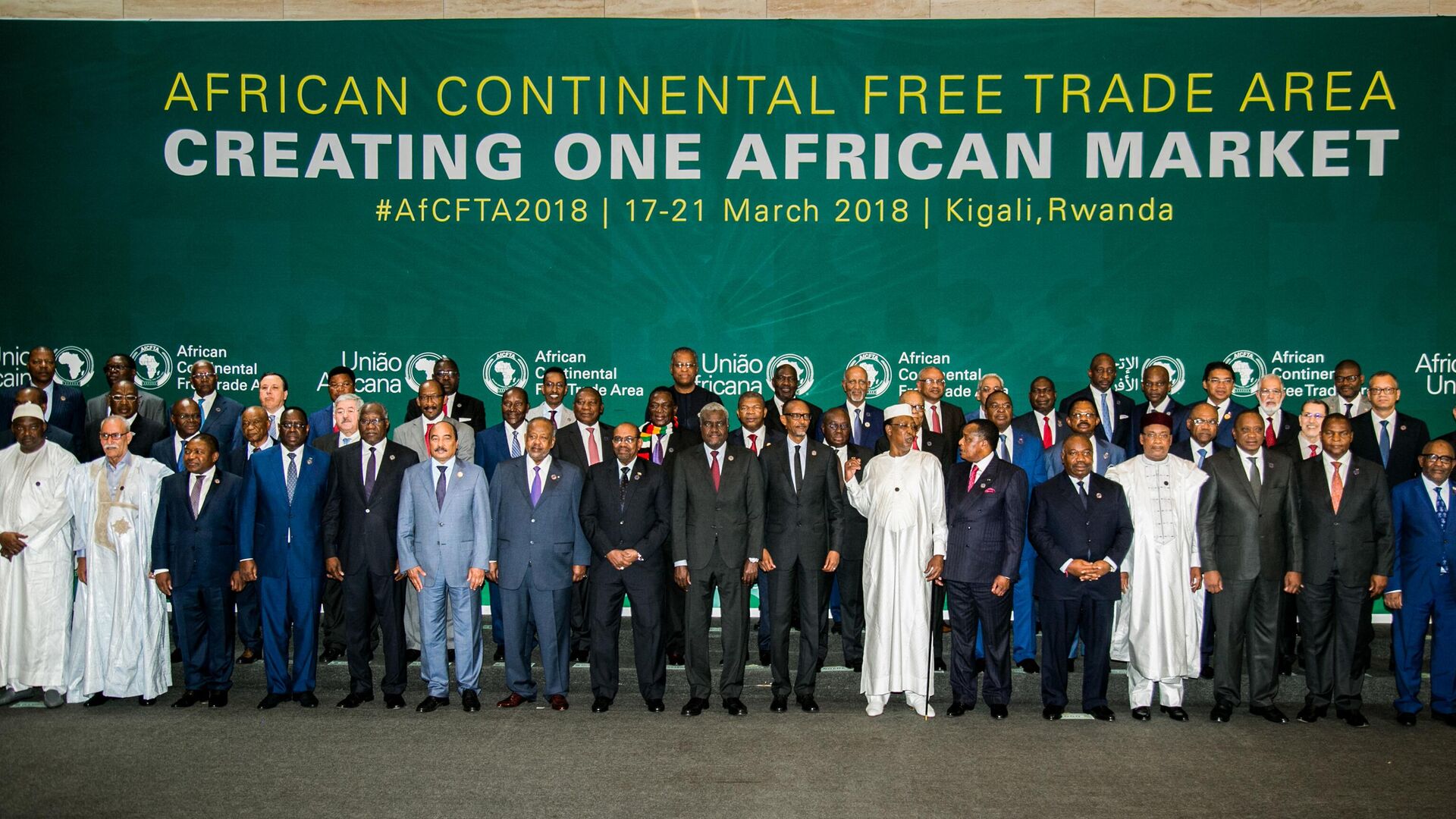https://en.sputniknews.africa/20230423/african-private-sector-calls-for-further-trade-liberalization-within-afcfta-1058796853.html
African Private Sector Calls for Further Trade Liberalization Within AfCFTA
African Private Sector Calls for Further Trade Liberalization Within AfCFTA
Sputnik Africa
Representatives of the continent's private sector urged governments to facilitate the process of trade liberalization within the African Continental Free Trade Area (AfCFTA) by bridging visa regimes.
2023-04-23T12:59+0200
2023-04-23T12:59+0200
2023-08-03T10:44+0200
sub-saharan africa
african union (au)
african continental free trade area (afcfta)
free trade
free trade agreement
cooperation
development
african development bank (afdb)
regional integration
economy
https://cdn1.img.sputniknews.africa/img/07e7/04/17/1058797741_0:160:3072:1888_1920x0_80_0_0_13a331c22687084eaaf35fa15dfd57c7.jpg
Representatives of Africa's private sector have urged governments to facilitate the process of trade liberalization within the African Continental Free Trade Area (AfCFTA) by bridging visa regimes and easing customs procedures. The call was made at the AfCFTA Business Forum, held last week in Cape Town, South Africa. The forum brought together businesses and government officials who discussed ways of unlocking trade and investment opportunities on the continent. The participants in particular pointed at inconsistent and inadequate logistics at the borders, as well as persisting non-tariff barriers, underlining that they have long been hampering intra-African trade.According to John Kalisa, a chief executive officer at the East African Business Council, under AfCFTA, trade between African countries is expected to surge, but this growth is significantly hindered by various non-tariff barriers, including delays in the application of visas for people transporting the goods. Speaking at the official opening of the forum, he noted that member states from several regional blocs, such as EAC, SADC and ECOWAS, have different visa rules. Kalisa underscored that these visa regimes should be liberalized as they delay the movement of people trading across the borders. In this process, he emphasized, a critical responsibilty belongs to regional economic communities, which have "to enable the business community to take advantage of the opportunities presented by AfCFTA."The AU Commission Deputy Chairperson Monique Nsanzabaganwa echoed his remarks stating that non-tariff barriers to trade, especially transport logistics, still constitute a major problem and obstacle for enhancing trade cooperation on the continent. According to her, apart from long custom delay periods due to visa challenges, many African states face a lack of paved roads and significant losses of goods due to the absence of cold chain facilities. Nsanzabaganwa underlined that as of now, 47 member states of the African Union have ratified the AfCFTA agreement, saying that its time for the customs authorities "to do the necessary."The agreement founding AfCFTA was initially signed by 44 of AU's member states in Kigali, Rwanda in March 2018. It is the largest free-trade area by number of participating states, as well as the biggest in population and geographic size. In 2019, the AfCFTA entered its operational phase, while in January 2021, it officially commenced.
https://en.sputniknews.africa/20221216/1058500178.html
Sputnik Africa
feedback@sputniknews.com
+74956456601
MIA „Rossiya Segodnya“
2023
News
en_EN
Sputnik Africa
feedback@sputniknews.com
+74956456601
MIA „Rossiya Segodnya“
Sputnik Africa
feedback@sputniknews.com
+74956456601
MIA „Rossiya Segodnya“
african continental free trade area (afcfta), sub-saharan africa, regional integration, cooperation, economy, trade relations, non-tariff barriers
african continental free trade area (afcfta), sub-saharan africa, regional integration, cooperation, economy, trade relations, non-tariff barriers
African Private Sector Calls for Further Trade Liberalization Within AfCFTA
12:59 23.04.2023 (Updated: 10:44 03.08.2023) The African Continental Free Trade Area (AfCFTA) is an ambitious regional initiative aimed at creating one African market. By eliminating trade barriers, the AfCFTA looks to boost intra-African trade in goods and services by more than 25% by 2040. Goods and services currently comprise only 15% of the continent's overall trade.
Representatives of Africa's private sector have urged governments to facilitate the process of trade liberalization within the African Continental Free Trade Area (AfCFTA) by bridging visa regimes and easing customs procedures.
The call was made
at the AfCFTA Business Forum, held last week in Cape Town, South Africa. The forum brought together businesses and government officials who discussed ways of unlocking trade and investment opportunities on the continent.
The participants in particular pointed at inconsistent and inadequate logistics at the borders, as well as persisting non-tariff barriers, underlining that they have long been hampering intra-African trade.
According to John Kalisa, a chief executive officer at the East African Business Council, under AfCFTA, trade between African countries is expected to surge, but this growth is significantly hindered by various non-tariff barriers, including delays in the application of visas for people transporting the goods.
"As we say, goods move with people. This idea of taking more than three days waiting for a visa application at the border is killing intra-trade. As members of the African Business Council, we want African countries to eliminate visa applications at the border and reduce the amount of time it takes to fill in customs paperwork," Kalisa is quoted as saying by local media.
Speaking at the official opening of the forum, he noted that member states from several regional blocs, such as EAC, SADC and ECOWAS, have different visa rules. Kalisa underscored that these visa regimes should be liberalized as they delay the movement of people trading across the borders.
In this process, he emphasized, a critical responsibilty belongs to regional economic communities, which have "to enable the business community to take advantage of the opportunities presented by AfCFTA."
“The projected increases can only be a reality should the regional blocks eliminate visa delays at the border," Kalisa argued.
The AU Commission Deputy Chairperson Monique Nsanzabaganwa echoed his remarks stating that non-tariff barriers to trade, especially transport logistics, still constitute a major problem and obstacle for enhancing trade cooperation on the continent.
According to her, apart from long custom delay periods due to visa challenges, many African states face a lack of paved roads and significant losses of goods due to the absence of cold chain facilities.
Nsanzabaganwa underlined that as of now, 47 member states of the African Union have ratified the AfCFTA agreement, saying that its time for the customs authorities "to
do the necessary."
"It is equally an opportune moment to galvanize the continent from the extra-continent dynamics and start looking for home-grown solutions," she said.
The agreement founding AfCFTA was initially signed by 44 of AU's member states in Kigali, Rwanda in March 2018. It is the largest free-trade area by number of participating states, as well as the biggest in population and geographic size. In 2019, the AfCFTA entered its operational phase, while in January 2021, it officially commenced.


